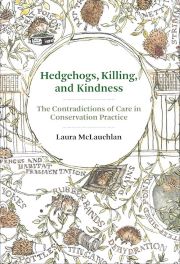Hedgehogs, Killing and Kindness

Laura McLauchlan
MIT Press, £43.00
Conservation cannot avoid contradictions – every organism thrives at the expense of another, meaning it is impossible to protect all of nature. We all make choices about which aspects of nature to care for, and in the case of hedgehogs, that has deathly consequences. In Aotearoa/New Zealand, care for native birds can necessitate the killing of hedgehogs, and care for hedgehogs can threaten the survival of native birds.
In Hedgehogs, Killing and Kindness, anthropologist Laura McLauchlan describes her fieldwork in the UK and Aotearoa/New Zealand. In the UK, where hedgehogs have declined by 95% since the mid-1950s, she spends time with people who care for sick and injured hogs. In Aotearoa/New Zealand, she speaks to conservationists intent on eradicating hedgehogs and other non-native mammals.
She describes the motivations and actions of her interviewees, often working alongside them to gain a deep understanding of their outlooks. Her description is deeply personal, as she writes about the emotional strain of spending months caring for injured hedgehogs in the UK, then subsequently setting traps for them with amateur conservationists in Aotearoa/New Zealand.
The book is made particularly thought-provoking by McLauchlan’s awareness of her perspective as a pākehā (non-Māori, settler-descended New Zealander). This allows her to critique aspects of dominant conservation culture, starting with the acknowledgement that it is indeed a culture, not a self-evident truth.
As she highlights, there is a danger in believing that certain values are objective. In Aotearoa/New Zealand, the need to kill non-native animals is seen as obvious. Alternative perspectives can be written off as irrational and illegitimate (in public at least). This conviction that killing hedgehogs is obviously justified can make a conservationist’s life more comfortable – there is no need to feel regret over the deaths. However, people who experience discomfort about killing may be motivated to do it more humanely, and may be more open to alternatives. There will always be the need to revisit the question of when and where killing is justified.
Dr Rebecca Nesbit
Reviewed by writer, artist and ecologist Dr Rebecca Nesbit


